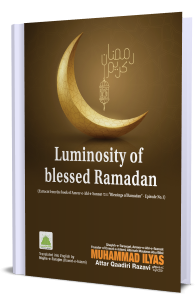
Be Considerate to Employees in Ramadan
Maulana Sayyid Imran Akhtar Attari
Once, on the last day of Shaban, the Prophet صَلَّى اللهُ عَلَيْهِ وَاٰلِهٖ وَسَلَّم addressed the people, first highlighting the greatness and blessings of the upcoming month of Ramadan. He then mentioned that Allah Almighty has made fasting obligatory during this month and declared the night prayers as voluntary (nafl). Furthermore, the Prophet صَلَّى اللهُ عَلَيْهِ وَاٰلِهٖ وَسَلَّم stated that the reward for performing a voluntary act of worship in the month of Ramadan is equivalent to the reward for fulfilling an obligatory (farḍ) act, and the reward for obligatory acts is multiplied 70 times. In the same address, he referred to Ramadan as the month of patience and empathy. Towards the end, the Prophet صَلَّى اللهُ عَلَيْهِ وَاٰلِهٖ وَسَلَّم encouraged owners to be lenient to their slaves and create ease for them, stating that whoever is lenient to their slaves, Allah will forgive them and grant freedom from Hell.[1]
In light of the advice mentioned in this hadith, it is crucial for both employees and employers to understand a few points:
1. Fasting during the month of Ramadan is obligatory for every sane and mature Muslim.[2] Hence, if someone is weak, a servant or labourer, they should not let their faith and enthusiasm to practise diminish. They should remember that a true believer is neither lazy nor inactive; rather, a believer becomes spiritually and physically more active during Ramadan compared to other times. A believer neither sees fasting, salah and other acts of worship as an obstacle in the way of his worldly commitments, nor does he forgo worship due to pursuing a livelihood. Therefore, despite any fatigue experienced because of work, he remains committed to fasting, keeping in mind the Prophet's صَلَّى اللهُ عَلَيْهِ وَاٰلِهٖ وَسَلَّم statement that Ramadan is a month of patience and the rewards for acts of worship in this month are immense. Hence, even if fasting is difficult for such a person due to weakness or strenuous work, he fasts due to the reward being great too.
2. The general advice from this hadith is for everyone, but particularly for employers, whereby Ramadan is referred to as a month of empathy. According to the hadith, one great way of demonstrating empathy in this month of Ramadan is for employers to show leniency to their slaves. Although there are no slaves in this era, labourers, employees, workers, drivers, and others do exist today who work for someone else. Be it summer, winter, autumn, spring; a state of sadness, happiness, illness, good health; or the state of fasting in Ramadan; these people endure the toilsome challenges at work. Do they not suffer fatigue and want to rest? Of course, they do. They feel tired and wish for ease, but their household and financial needs compel them to be tolerant regardless of whether it is Ramadan or not, and regardless of whether they are healthy or sick. Hence, based on the teachings of Islam and humanity, employers, seniors and managers should consider the challenges faced by employees on normal days and even more so when they are fasting in Ramadan. In Ramadan, they should show kindness, gentleness, and be empathetic to them in this month of empathy. They should fast themselves and also be mindful of the workers who are fasting. They should earn their duꜤāˈs by reducing their workload or overall working hours. By offering such provisions, they can make themselves from those who are beloved to Allah and also become worthy of the glad tidings given by the Prophet about forgiveness and freedom from hellfire. A Hadith states, “All of creation are dependents of Allah, and the person most beloved to Allah is the one who benefits His dependents the most.”[3]
Parents should be mindful of these things and make concessions when assigning work to their sons, as should husbands in relation to their wives, as well as family members in relation to their mothers and sisters.
May Allah Almighty enrich us with the blessings of Ramadan and grant us the ability to create ease for our employees and subordinates.
اٰمِیْنْ بِجَاہِ خاتَمِ النَّبِیّٖن صلَّی اللہُ عَلَیْہ ِوَاٰلِہٖ وَسَلَّمَ


















Comments